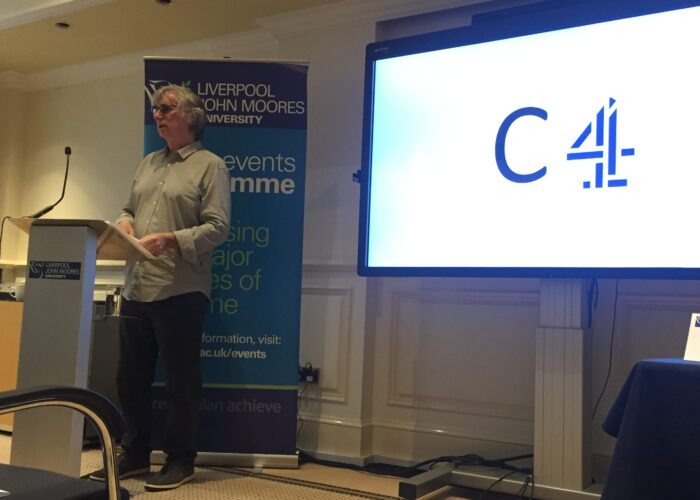
The debate surrounding Channel 4’s potential move from London was brought to Liverpool this week, as competing visions of the future were set out in an impassioned conversation hosted by LJMU.
Phil Redmond, who is leading the bid to bring Channel 4 to Liverpool, gave a keynote address at Egerton Court on Monday, before Andy Bounds of the Financial Times chaired a lively panel discussion.
The location of Channel 4’s headquarters has been a hot topic in the media industry since a consultation process started this year, following the Conservative Party’s General Election manifesto pledge to relocate the publicly-owned broadcaster away from the capital.
Mr Redmond’s speech centred on three drivers: his view that the Government needs to take action; there has to be a will to move all of Channel 4 – not just parts of it; and also the need to address a media deficit in the United Kingdom.
The LJMU Ambassador Fellow and CBE highlighted Brookside and Hollyoaks as two of his local TV creations that, at one point, were contributing to 60% of Channel 4’s income.
YouTube: Portia Testa, JMU Journalism TV
However, panel member Stephen Chapman, a TV producer and writer for Prolific North, said: “I don’t think relocating Channel 4 is realistic now. The Conservatives promised it while expecting a big majority [in the General Election] and they didn’t get it. It will be hard to push through.”
Richard Caborn, the former Labour MP and Minister of Sport, is chairing the bid by Sheffield, and he said the Steel City’s current technological mobilisation made a compelling case.
McLaren and Boeing, who chose Sheffield as the home of their first ever European manufacturing plant, have both started to build factories in Sheffield over the past year, and Mr Caborn believes this is evidence enough.
He told JMU Journalism: “I come from a different viewpoint to the others, I believe this decision should be technologically-driven.

“Content is very important, but if content can’t get out there, because it’s being taken over by others, I think it would be a huge opportunity missed. Channel 4 could put themselves centre stage in developing a new institution.”
Gill Wilson, Head of Features at Channel 4, was on the side of keeping the broadcasting giant at its current home in London, but rejected the notion that this ruled out regionalisation in principle.
Her proposed solution involves the BBC, ITV and C4 working together to create an independent production community, as she said: “It’s about how much money should be spent in the nation and regions – it’s one of the first things we need to address as a matter of urgency.”
A debate has to have ‘a winner’, so Mr Bounds, the FT’s Northern Correspondent, asked audience members what they believed was in the best interests of Channel 4. A show of hands came out in favour of it moving to a completely new destination.
The consultation process and debate will go on, with more than a dozen cities and regional locations lobbying the Government to reach a decision over Channel 4 in their favour.

